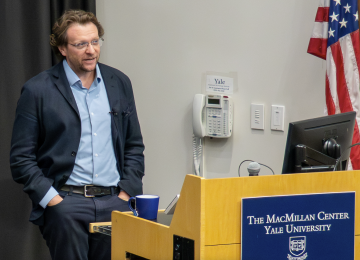Rethinking How We Listen: Peter Pomerantsev on the Power of Identity and Information
“How do we reach audiences who do not want to listen?”
The question framed this year’s George Herbert Walker Jr. Lecture, sponsored by the MacMillan Center, delivered on September 18 by Soviet-born journalist and author Peter Pomerantsev, who called it “the puzzle that keeps me up at night.” The lecture, while focused on the effects of Nazi propaganda during World War II, highlighted its relevance for today’s media and how transparency can help protect against misinformation.
Pomerantsev, the writer of Nothing is True and Everything is Possible, This is Not Propaganda, and his most recent book How to Win an Information War: The Propagandist Who Outwitted Hitler, explained that propaganda is not just about persuasion but about shaping identity. His work in collaboration with co-researchers Maria Snegovaya and Graeme Robertson, shows that in Russia, support for war is tied to a sense of national belonging that combines superiority with victimhood. That identity, he noted, often outweighs exposure to diverse media.
Looking to history, Pomerantsev discussed Sefton Delmer, the British propagandist who during World War II, created radio stations that imitated German voices and frustrations. These broadcasts, he observed, “pushed Nazi propaganda into the absurd,” allowing listeners to recognize contradictions and think for themselves. “We have to stop trying to moralize to these people,” Pomerantsev said, suggesting instead methods of communication that disrupt the emotional hold of propaganda and create space for alternative perspectives.
The challenge I face, and my colleagues face, is not communicating things for the sake of communicating things,” he added. “It’s how to communicate what’s going on with the war in ways that create space for critical thought.
Molly Brunson, Associate Professor of Slavic Languages and Literatures and History of Art, and Director of the Russian, East European, and Eurasian Studies Program (REEES) at the MacMillan Center, reflected on the lecture’s significance.
“Peter reminds us that propaganda and media manipulation are not only products of the early Putin years and Russia’s war in Ukraine, but were also paramount to the rise of radio during the Second World War as well. And even more, by thinking carefully about these moments, we might even find the tools for countering disinformation today.”
Ultimately, the lecture emphasized how propaganda is not only a matter of history but also a defining issue in current debates about war, democracy, and the power of narrative. The challenge is not just exposing lies, but to rethink how we listen, and how communication can build trust in challenging times.
Pomerantsev was nominated by REEES as part of the European Studies Council. Established in 1988, the George Herbert Walker Jr. Lecture has brought leading figures to Yale to address questions of global importance. Previous speakers have included Permanent Representative of Myanmar to the United Nations Kyaw Maw Tun, former U.N. Secretary-General Ban Ki-moon, and former Assistant Secretary of State for East Asian and Pacific Affairs and Ambassador to the Republic of Korea Christopher Hill.



